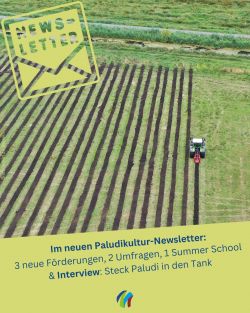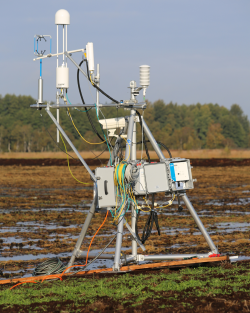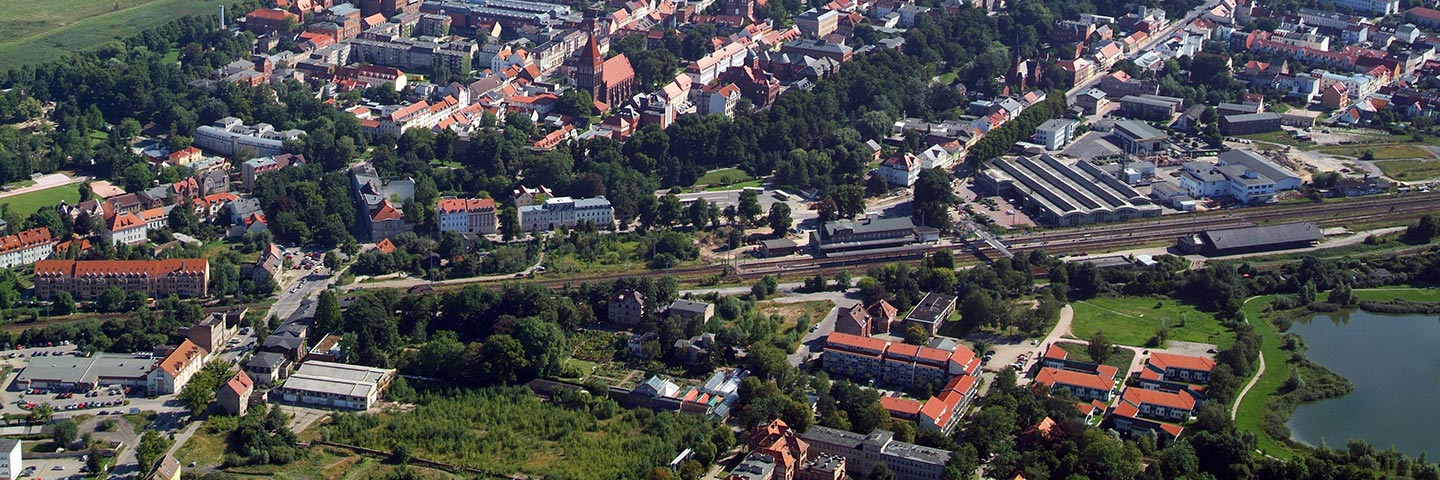News/All pieces
New resilience check for Germany
with paludiculture and agrivoltaics/peatland PV
11/12/2025 In its latest resilience dossier, the Office of Technology Assessment at the German Bundestag (TAB) informs members of parliament about possible developments in ‘water management in agriculture’ in future scenarios up to 2050. It also covers the potential of new forms of use, such as agrivoltaics, peatland-photovoltaics and paludiculture on rewetted and previously drained agricultural land (link to the dossier in german).
The dossier considers agrivoltaics and peatland PV to be particularly promising. It states that partial shading by PV modules could reduce evaporation and thus conserve water resources. Furthermore: ‘For peatland-photovoltaics (peatland PV) ... an estimated technical potential of 440 to 880 GWp is assumed in Germany. This corresponds to approximately four to eight times the photovoltaic capacity currently installed in Germany and illustrates the enormous energy potential of this use.’ However, our knowledge of the effects of peatland PV is still limited, and further research is needed before large-scale implementation can be recommended. Projects such as MoorPV and MoorPower are currently conducting research about it.
The dossier assesses paludiculture as follows: ‘Agriculture on rewetted peatland areas with peat conservation, known as paludiculture, therefore still occupies a niche position ... However, this could change by 2050 due to the great potential for climate protection.’ Prof. Dr. Gerald Jurasinski, Carl Pump and Dr. Wendelin Wichtmann contributed their expertise to the dossier.
About the resilience dossiers:
The resilience check and the resulting dossier are a consulting service for the German Bundestag and serve as background information for specialist committees, as well as for social actors and the public. It analyses the potential of scientific and technological developments and discusses their possible impact on society. It discusses on an infrastructure-related topic each year. The 2026 edition of the Resilience Check will concentrate on ‘Cybersecurity in Research’.
The big spread
300 m³ of peat moss on 6 hectares
05/12/2025 A total of 300 m³ of peat moss was spread over 6 hectares in MOOSland. The project aims to help a small plant make it big – peat moss.
As a renewable raw material, it can replace peat in horticulture, e.g. in vegetable production. It can be cultivated in a climate-friendly manner on rewetted degraded raised bogs
and, with a total of only 10 t CO₂ eq/ha/year (including harvesting, cf. Daun et al. 2023), it performs three times better than raised bog grassland (32 tonnes) in terms of GHG emissions.
Research projects over the past 20 years have shown that sphagnum moss cultivation works. The cultivation method is now being optimised on the MOOSland trial areas in Hankhauser Moor and Barver Moor.
The land was prepared with particular care: only a minimal amount of topsoil was removed, access roads serve merely as boundaries, and the irrigation system has been minimised. Sowing was carried out using a caterpillar track to protect the sensitive peatland soil.
Scientists are now investigating how peat mosses grow in this new production system compared to the old one and what effects this has on greenhouse gas balance, biodiversity, hydrology, nutrients, economics, etc. The two sites differ in terms of climatic and hydrological conditions. The aim is to use this information to develop a handbook of measures for the successful implementation of peat moss paludiculture and its limitations. Both demonstration areas also serve as visual aids for numerous interested groups and, in particular, for the parallel stakeholder process in the two districts.
🔗 More about the MOOSland model and demonstration project at moosland.net.
When knowledge drives politics
Research award for GMC representatives
04/12/2025 Not just producing knowledge, but bringing it into politics – on 11 December, environmental lawyer Prof. Dr. Sabine Schlacke and peatland researcher PD Dr. Franziska Tanneberger will be honoured with the Greifswald Research Award for their work. The Greifswald University Club presents this award for outstanding achievements in applied research. All interested parties are cordially invited to the festive award ceremony, which begins at 4 p.m. The keynote speech, ‘Global climate protection through the courts – groundbreaking solution or dangerous encroachment?’, will be given by Prof. Dr Andreas Korbmacher, President of the Federal Administrative Court. Please register by 12 noon on 11 December 2025 at pressestelle@uni-greifswald.de. More information is available in the University of Greifswald media release.
Our post-COP30 peatland series
What about outcomes and perspectives?
28/11/2025 In our short post-COP30 peatland series we’ve asked FranziskaTanneberger for commenting with experiences from the ground as a member of the German delegation in Belém.
High on the agenda: the “Peatland Breakthrough” at 17th November – a global call to action by a strong peatland partnership, including Greifswald Mire Centre. Why it wasn’t the breakthrough itself yet, but rather a pre-launch publishing the Science-based Framework for Global Peatland Targets & Guiding Principles, Franziska explains in this video: COP30 Series – Part 6: #Peatland Breakthrough – not yet, but... .
Nevertheless, the side event was a considerable success: Germany joined Peru and Uganda in being a Champion Country for the Peatland Breakthrough, which is a collaborative effort to accelerate and mobilize action to conserve, rewet and restore, and enable the sustainable, wise use of the world’s peatlands.
Also, Franziska Tanneberger stresses that science-based targets for peatlands Included of the official Outcome Report of the Global Climate Action Agenda at COP 30 | UNFCCC of COP30 is an encouraging outcome. Find peatland content there on p. 18 and hear more about it in this video: COP30 Series - Part 4: COP 30 Outcome
There is peatland perspective for the upcoming COPs: the next global climate summit (UNCCC) will take place in Antalya/Turkey – under Australian leadership. Of course, the country doesn’t sport as much peatlands as Brazil – the tropical country with the largest area of peatlands – but there is a lot of activity on these ecosystems especially in neighbouring Caucasian countries. And also the next meeting of the Convention on Combatting Desertification (UNCCD) in Ulan Bataar/Mongolia is likely to have a focus on peatlands. More details in:COP30 Series - Part 5: #COP30 Preview next COP
More details about peatland events on COP30 with involvement of Greifswald Mire Centre in this media information of Greifswald University.
MoorNet finish

with useful outcomes
18/11/2025 Since 2022, MoorNet has been providing technical support as a research and development project for the implementation of the National Peatland Protection Strategy (Nationale Moorschutzstrategie) and networking amongst peatland protection stakeholders in Germany. With useful outcomes that are still publicly available:
The MoorNet project database provides information on projects, funding and institutions. New projects can be registered there using this form.
The MoorNet mailing list sends latest news on peatlands, and those interested can still register online.
The MoorNet final conference in mid-November 2025 demonstrated the wealth of expertise, commitment and experience within the German peatland conservation community. Over three days, more than 150 participants from administration, practice and science shared knowledge, exchanged experiences, discussed problems and debated solutions. An excursion to a rewetting project in Brandenburg completed the programme. Presentations and selected contributions from the conference will soon be published as videos at the MOORNet-Website – for anyone who would like to delve deeper into the content or review it.
Germany joins the Peatland Breakthrough
Germany joins as Champion country
18/11/2025 Across two high-level COP30 official side events in Belém, the Peatland Breakthrough took a major step forward by launching its Science-Based Framework for Global Peatland Targets and Guiding Principles—a milestone that sets clear global goals to protect one of the planet’s most powerful natural climate buffers. The launch also marked the official opening of the endorsement process, inviting governments and non-state actors to join the growing international coalition.
A key highlight of this COP30 for peatlands was Germany’s announcement that it is joining the Peatland Breakthrough as a Champion Country, reinforcing global momentum for peatland protection. Germany joins Peru and Uganda in leading efforts to align national action with the new science-based targets.
Peatlands cover just 3–4% of Earth’s land surface but store up to one-third of global soil carbon—twice as much as all the world’s forest biomass. Yet degraded peatlands contribute 4–5% of annual human-made emissions. The new Framework aims to reverse this trend through coordinated global policy, investment, and implementation.
Jochen Flasbarth, the German State Secretary for the Federal Ministry for the Environment, Climate Action, Nature Conservation and Nuclear Safety, emphasised the urgency of taking action to reach the country's net-zero target by 2045:
“In Germany we drained 95% of our peatlands, and today we see the consequences. Peatlands now account for 7.5% of our national greenhouse-gas emissions, which makes restoring them one of our biggest challenges — and essential to reach our 2045 net-zero target. Rewetting is the way to stop emissions from drained peatlands, and in the future rewetted areas may even contribute to negative emissions. This is why Germany is investing billions in rewetting and why we are working closely with partners around the world, from Eastern Africa to Patagonia, to accelerate peatland restoration.”
Coenraad Krijger (CEO of Wetlands International) and Jochen Flasbarth (State Secretary at the Federal Ministry for the Environment, Nature Conservation and Nuclear Safety, Germany) with the letter announcing Germany will be the newest Champion Country of the Peatland Breakthrough. © Peatland Breakthrough
With the launch in Belém, partners set the stage for the official global rollout of the Peatland Breakthrough in 2026 and called on countries and organizations worldwide to endorse the new targets and join the effort to unlock the full climate potential of peatlands.
You can find the full story in the links below:
- The Peatland Breakthrough Launches Science-Based Global Targets and Opens Call to Join
- Germany joins the Peatland Breakthrough as a Champion Country
About the Peatland Breakthrough
The Peatland Breakthrough is a global call to action led by Wetlands International, the United Nations Environment Programme, the Food and Agriculture Organization of the United Nations, and the Greifswald Mire Centre, developed in close alignment with the Global Peatlands Initiative, and in collaboration with the Convention on Wetlands. The growing list of partners include: Global Environment Centre, Landscape Finance Lab, RE-PEAT, and The Nature Conservancy.
New Paludiculture Newsletter

Latest issue just out
18/11/2025 Lots of useful information in the latest issue of the newsletter with news on
- 3x funding for paludiculture projects
- 2x surveys on paludiculture
- 1x Paludiculture Summer School
Also
- in the Paludiculture Interview: Pauldi in cascade – from the field to the barn to the tank
- The big spread – MOOSland distributes seeds on a large scale
- Film series on how-tos for rewetting
We enjoy staying in touch with our readers. What topics would you like to see covered in the paludiculture newsletter? What feedback do you have for us? Feel free to email us at communication@greifswaldmoor.de.
COP30 is a chance for peatlands
We are taking it at these events
15/11/2025 Trying to make maximum impact for peatlands at COP30 in Brazil with Franziska Tanneberger, co-director of the Greifswald Mire Centre, on the ground at these events:
17.11. Security from the Ground Up: Soils and the Foundations of Resilience
This high-level session will explore how land restoration, soil governance, and ecosystem recovery (e.g. peatland rewetting) can advance climate resilience, post-war reconstruction for example in Ukraine, and regional stability — building security from the ground up.
🗓️ Monday, 17th November 2025, 10:30-12:00 a.m. (local time in Belém), 14:30 (CET)
📍 Ukraine Pavilion
👉 More info: Security from the Ground Up: Soils and the Foundations of Resilience
17.11.: Mainstreaming NBS for climate resilience in EAC
The side event showcases how East Africa is advancing climate-resilient development through Nature-based Solutions—from large-scale landscape restoration to sustainable peatland management—while strengthening regional cooperation and highlighting pathways for partnership financing and policy integration.
📆 Monday, 17th November 2025, 11-12:30 (local time in Belém),15 (CET)
📍 EAC Pavilion C-72
17.11. The Peatland Breakthrough: From Evidence to Action
Together, we’ll explore how evidence-based action can accelerate peatland conservation, restoration and sustainable use as essential pathways for climate mitigation, biodiversity protection and resilient communities.
🗓️ Monday, 17th November 2025, 14:30–15:30 (local time in Belém), 18:30 (CET)
📍 Nature Hub Pavilion, Blue Zone
👉 Register: The Peatland Breakthrough: From Evidence to Action
17.11. Peatland Breakthrough
This event will explore how the Peatland Breakthrough is catalyzing global action, and uniting countries, communities, and companies to restore and protect one of the world’s most carbon-dense ecosystems: peatlands
📆 Monday, 17th November 2025, 18:30—20:00 (local time in Belém), 22:30 (CET)
📍 Side Event Room 1, Blue Zone
👉 Register: PEATLAND BREAKTHROUGH: A Global Call to Unlock the Power of Peatlands
💚 Livestreaming available for COP30 virtual-only registered participants
20.11.: Nature-based Climate Action as a Key Instrument for achieving Germany's Climate Target
The side event presents the recommendations of the Scientific Advisory Board for Germany’s Nature-based Climate Action (WBNK) for the further development of the Action Plan. The event will particularly focus on peatland restoration and rewetting on different continents.
🗓️ Thursday, 20th November 2025, 10:15-11:15 (local time in Belém) 2:15 p.m. (CET)
📍 German Pavilion
👉 More info: https://german-climate-pavilion.de/?pgm=124&nav=14&language=eng&tz=America%2FBelem
21.11.: Signing Joint Declaration between International Tropical Peatland Centre and Greifswald Mire Centre
🗓️ Friday, 21st November 2025, 10:15-11:15 (GMT-3)
📍 Indonesia Pavilion Open Stage, Blue Zone
👉 More info: https://www.tropicalpeatlands.org/event/signing-joint-declaration-between-itpc-and-greifswald-mire-centre-germany
21.11.: Integrating Peatland Restoration and FOLU within the Global Carbon Market Framework
Tropical peatlands play a critical role in global climate regulation as long-term carbon reservoirs. Nevertheless, their contribution to climate change mitigation and adaptation is increasingly threatened by degradation, insufficient financial support, and uncertainties in emerging carbon market mechanisms.
🗓️ Friday, 21st November 2025, 15:50–16:20 (GMT-3)
📍 Indonesia Pavilion Main Stage, Blue Zone
👉 More info: https://www.tropicalpeatlands.org/event/integrating-peatland-restoration-and-folu-within-the-global-carbon-market-framework
All events at #COP30 📍Belém, Brazil (CET-4)
Paludi Summer School 2026
Application now open!
14/11/2025 From 8 to 17 June 2026, the Paludi Summer School will take place at the Thünen-Institute in Braunschweig and at the Greifswald Mire Centre. It is primarily aimed at PhD candidates and other early-career scientists involved in PaludiNetz projects. Remaining places will be allocated to applicants outside the PaludiNetz in a second selection process.
A central goal is to strengthen interdisciplinary exchange and to network participants both with each other and with experts from research and practice. The focus is on jointly developing and deepening knowledge about paludiculture. The programme is supplemented by practical tasks, interactive workshops and excursions to project sites, rounded off by a number of leisure activities that provide opportunities for exchange and networking. Each participant is asked to give a presentation on their own research topic – an opportunity to share ideas, receive feedback and learn from each other.
Registrations are open until 31 December 2025 via this form.
New: Eddy tower on peat moss

for accurate greenhouse gas emissions
14/11/2025 A brand new eddy covariance tower has recently been installed on one of the pilot sites in the MOOSland project. It continuously records CO₂ and methane fluxes across the entire area, including causeways, ditches and peat mosses. Over the next eight years, scientists want to use it to measure how climate-friendly a peat moss paludiculture is.
The ‘Eddy’ took a day and three people to set it up, plus a lot of preparatory work, of course, such as testing the equipment in the laboratory, laying power cables to the site and building a rudimentary platform out of planks. The tripod was built up within four hours on site. Then, electrical boxes and data loggers were attached to the tower. These are responsible for communication between the instruments, including CO₂ and methane sensors, a camera, a pressure gauge and a router for data transmission to the outside world. Each instrument has its own IP address for remote access. This not only enables the instruments to be accessed, but also controlled – a special feature of this Eddy tower that goes beyond the standard. The following day, only a little fine-tuning was needed to optimise the angles, distances and alignment of the sensors. Now the ‘Eddy’ is up and running, and the scientists expect to receive the first evaluations in about a month.
Why it matters: The collected data provides a reliable basis for policymakers, businesses and researchers to assess and optimise the climate impact of peat moss paludiculture. Further insights in the set up can be seen in this video (in German).








